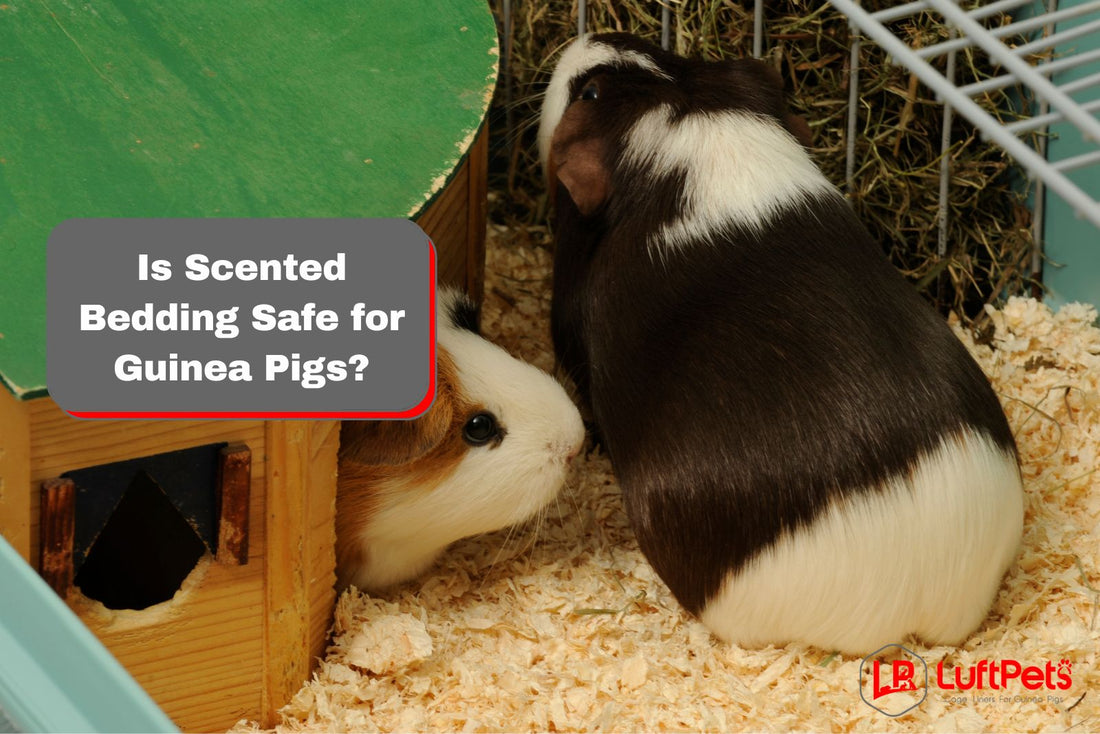Worried about whether scented bedding is safe for guinea pigs? You're not alone in this concern.
Although scented bedding smells great, you need to be careful: It can be deadly to your furry friends!
As an animal care expert with a deep passion for these cuddly creatures, I've meticulously researched this topic to provide you with clear, concise answers - and ways to reduce the toxicity.
So, keep reading to discover the truth about scented bedding & how to ensure your guinea is safe!
Key Takeaways
- Natural Preferences: Guinea pigs have sensitive respiratory systems; natural, unscented materials are often best.
- Artificial Fragrances: Some scents may cause allergic reactions or respiratory distress in guinea pigs.
- Observe & React: Always monitor your guinea pig's behavior when introducing new bedding to detect any signs of discomfort.
Eager for the best guinea pig bedding? Don't skip the LUFTPETS premium guinea bedding - Get it ASAP!
Is Scented Bedding Harmful to Guinea Pigs? 5 Risks Explained
In short, while it offers a pleasant aroma for the enclosure, the potential health risks outweigh the olfactory benefits.

Here's a list of five dangers every guinea parent should know!
1. Chemical Exposure:
- What's in that Fragrance? Most scented beddings contain a mixture of chemicals. Safe for humans, but potentially toxic for guinea pigs.
- Constant Inhalation: Enclosed spaces mean guinea pigs continually inhale these fragrances, which could cause respiratory issues.
2. Skin Sensitivities:
- Sensitive Skinned Critters: The delicate skin of guinea pigs can react adversely to chemicals, causing irritations.
- Risk of Allergies: Like humans, guinea pigs might develop allergies to some fragrances.
3. Behavioral Changes:
- Stress Inducers: Unnatural scents can be stressors, leading to changes in behavior.
- Masking Essential Scents: Essential, familiar scents can be masked, causing confusion.
4. Dietary Concerns:
- Chewing the Bedding: If guinea pigs ingest chemically treated bedding, it might be harmful.
- Digestive Issues: Chemical ingestion can lead to potential digestive problems.
5. Environmental Concerns:
- Biodegradability: Many scented beddings aren't eco-friendly.
- Natural Alternatives: Environmentally friendly alternatives like hay or shredded paper are both safer and more sustainable.
Considering the potential risks, it's clear that while scented bedding might seem appealing at first, our guinea pigs' health should always come first.
Curious for more? See this video for a breakdown & some caveats surrounding scented bedding!
@happyhamstersuk Scented bedding is SO bad for rodents’ respiratory systems. #hamstertok #properhamstercare #hamstercare #ratcare #lavender #smallpets #smallanimals #pettok #animalcare #rodentsoftiktok #hamstersoftiktok #foryou #whatthefloof ♬ original sound - user23369840897
But why is scented bedding so popular? Let's find out!
The Rise of Scented Bedding: Why It's Popular
It's human nature to be drawn to pleasant scents. Scent has the power to evoke memories, uplift moods, and even influence purchasing decisions.
With the pet industry's ongoing evolution, companies have quickly realized that infusing pet products with alluring aromas can make them more appealing to consumers.
This holds true even for seemingly unconventional products like bedding. However, it's essential to consider that while humans may be enticed by these scents, our pets may have different reactions. For instance, you might find yourself wondering, "Why is my guinea pig eating his bedding?"
1. Aesthetic Appeal
For the modern pet owner, there's a desire to ensure that their home remains smelling fresh, despite housing a pet.
Scented bedding promises to mask any unpleasant odors, thereby aligning with this need for cleanliness and freshness.
2. Sensory Enrichment
Many believe that introducing different scents might stimulate their pets' senses, offering an enhanced living experience.
3. Perceived Hygiene
There's a common misconception that a fragrant environment equates to a cleaner one.
This perception can drive pet owners to opt for scented bedding in the hopes of maintaining a more 'hygienic' habitat.
Discover how to keep your guinea pig's habitat fresh and odor-free with these essential tips for reducing unpleasant smells:
Up next, let's explore how to pick the best guinea pig bedding options for these adorable pets. Dive deeper with us!
Step-by-Step Guide to Safer Scented Bedding
We all adore the sensory delight of pleasant aromas in our homes, and for pet owners, the allure of fragranced bedding has surged.
But as with anything that concerns our furry friends, ensuring safety is paramount.
If you're inclined towards using scented bedding for your pets, especially guinea pigs, let's delve into some DIY techniques to make it safer right in the comfort of your home.
Moreover, it's crucial to address the question: is aspen bedding safe for guinea pigs? This consideration ensures the well-being of your pet while keeping their habitat comfortable and enjoyable.
1. Start with Natural Ingredients
Opt for essential oils like lavender or chamomile. These not only have pleasant scents but are also known for their calming properties. Ensure you choose oils safe for pets.
2. Dilution is Key
Essential oils are potent. Always dilute them with carrier oil or water before any application. A general guideline is 1-2 drops of essential oil per cup of water.
3. Spray Technique
Once your diluted mixture is ready, transfer it to a spray bottle. Lightly mist the bedding, ensuring it doesn't get too damp. Allow it to air dry completely before placing it in your pet's enclosure.
4. Mix with Base Bedding
Instead of spraying, another technique is to mix a few drops of the diluted essential oil solution with the base bedding material, be it hay or shredded paper. This method evenly distributes the scent without overwhelming the space.
5. Observe and Adjust
Monitor your pet's behavior. If they seem agitated or avoid the bedding, it might be too strong or not to their liking. Adjust the scent intensity as needed, or try a different essential oil.
With a touch of DIY spirit and a keen eye on your pet's well-being, you can create a sensory-rich environment that's both delightful and safe.
Ready to explore more on the intricacies of pet care? Dive deeper into our next segment: 'Understanding Your Guinea Pig's Reaction: Signs to Watch For'.
Understanding Your Guinea Pig's Reaction: Signs to Watch For
Guinea pigs, often known for their adorable squeaks and playful nature, are also adept at communicating their comfort or discomfort in subtle ways.
As guinea pig parents, recognizing these signs is crucial to ensuring their well-being, especially when introducing new elements like scented bedding.
Let’s dive deep into understanding your guinea pig’s reactions and the telltale signs you should be on the lookout for.
1. Vocalizations

- Happy Squeaks: These high-pitched sounds generally indicate excitement, especially during feeding time or when they're anticipating a treat.
- Loud Whining or Moaning: This could be a sign of discomfort, fear, or annoyance. If you notice this after introducing a new scent, it may be too strong or irritating for them.
2. Physical Behavior
- Exploration: A guinea pig sniffing around or playfully burrowing in new bedding is a good sign they're comfortable with the change.

- Avoidance: If your guinea pig stays clear of a freshly scented area or refuses to rest there, this could be an indication that the scent is bothersome.
- Frequent Scratching: While occasional scratching is normal, excessive or frantic scratching may suggest an irritation, possibly from a fragrance.
3. Respiratory Responses
- Normal Breathing: Steady and even breaths are a sign of a relaxed and comfortable guinea pig.
- Rapid or Shallow Breathing: A sudden change in breathing patterns, especially after introducing new scents, might indicate respiratory distress or discomfort.
4. Eating Habits
- Regular Feeding: A guinea pig that continues its regular eating routine is likely at ease.
- Loss of Appetite: If your furry friend is avoiding food, especially their favorites, they might be stressed or unwell. Fragrances can sometimes impact appetite if they find it too overpowering.
5. Social Behavior
- Interactive and Playful: A sign they're in good spirits and comfortable with their surroundings.
- Hiding or Isolation: Continuous seclusion might be a sign of stress, fear, or discomfort. This can sometimes be a reaction to strong scents or changes in their environment.
Conclusion: Guinea pigs, though small, have a myriad of ways to communicate their feelings.
By closely observing these signs, you can ensure your pet's environment remains a haven of comfort. After all, their happiness and well-being are paramount.
Eager to learn more about creating the ideal habitat for your guinea pig?
Let's now explore 'Incorporating Studies: A Closer Look at Guinea Pig Needs.'
Experts Weigh In: Is Scented Bedding Safe for Guinea Pigs?
When it comes to providing the coziest nook for our furry friends, many guinea pig owners often wonder about the safety of scented bedding.
Here's what the experts have to say:
Natural Instincts and Scented Environments
Shelly Meszaros, a noted animal behaviorist, has emphasized that guinea pigs, with their innate curiosity, thrive in environments reminiscent of their natural habitats [1].
Adding fragrances, especially artificial ones, can be a departure from their instinctual preferences, potentially causing respiratory issues.
Comprehensive Guinea Pig Health
Dr. Vander Wey from Dr. Weldy's, a trusted name in the field of veterinary medicine, champions holistic guinea pig care [2].
When discussing bedding, she highlights the importance of prioritizing the respiratory systems of these little creatures [2].
Given that guinea pigs have sensitive respiratory systems, any foreign substance, including certain scented beddings, might not be suitable.
Bedding for guinea pigs isn't just about the olfactory experience; it's a health consideration. Scented options, especially those derived from pine shavings or cedar shavings, might cause harm. Thus, fleece liners or absorbent bedding, free from strong scents, come highly recommended by many experts in the field.
Wondering specifically about pine bedding? Dive into our detailed article on "Is Pine Bedding Good for Guinea Pigs?" for an in-depth look.
In conclusion, while the idea of fragrant bedding might be appealing to us, it's imperative to consider what's best for our pets.
Expert opinions point towards caution; always prioritize the well-being of our delicate, furry companions when choosing bedding.
Leap into the next section for some common questions & more tips!
FAQs
- What are the signs my guinea pig is uncomfortable with the bedding? Symptoms include sneezing, difficulty breathing, or reluctance to rest on the bedding.
- Are there safe alternatives to scented bedding? Yes, options like unscented paper-based bedding, hay, or aspen shavings are preferred.
- How often should I change the bedding? Ideally, spot clean daily and do a complete change once a week to maintain cleanliness.
Conclusion
So you've asked yourself "Is scented bedding safe for guinea pigs?" and know the truth: it can be brutal. But before you click away, here's a brief review...
Determining if scented bedding is safe for guinea pigs is crucial for their well-being.
With the right information and vigilant observation, you can ensure a comfortable, healthy environment for your furry friend.
At last, don't forget to leave a comment and tell me all about your experiences!
Until next time...
Resources
1. Meszaros S. Guinea Pigs [Internet]. Dr. Exotic; 2011 Mar 19. Available from: https://www.drexotic.com/care-and-feeding-of-guinea-pigs/
2. Vander Wey A. Ask A Vet: Guinea Pig Pointers [Internet]. Dr. Weldy's; 2017 Mar 5. Available from: https://www.drweldys.com/sites/site-6325/documents/Articles/Guinea_Pig_Pointers.pdf



